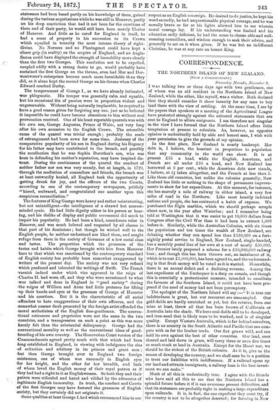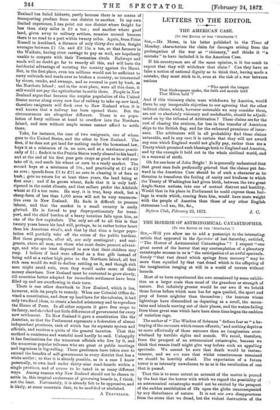CORRESPONDENCE.
THE NORTHERN ISLAND OF NEW ZEALAND.
[nom A CORRESPONDENT.] Steamship Nevada, November 9. I WAS talking two or three days ago with two gentlemen, one of whom was an old resident in the Northern Island of New Zealand, while the other, like myself, was a visitor. Both declared
that they should consider it sheer insanity for any man to buy land there with the view of settling. At the same time, I see by the papers that speakers at a meeting of the Agricultural League have protested strongly against the coloured statements that are sent to England to allure emigrants. I am therefore not singular in the view I have formed that the Northern Island offers little temptation at present to colonists. As, however, an opposite opinion is undoubtedly held by able and honest men, I wish with your permission to give the grounds of my *pion.
In the first place, New Zealand is nearly bankrupt. Her debt is, I believe, the heaviest in proportion to population that any community in the world can show. It is at present 135 a head, while the English. American, and French are all under £.30 a head, and Now Zealand has borrowed at 6 per cent., while the American debt now stands, I believe, at 5 taken altogether, and the French at less than 5. Like those old countries, but unlike the colonies generally, New Zealand has little or nothing in the shape of permanent improve- ments to show for her expenditure. At this moment, for instance, she has scarcely a mile of railway in either island, a very few miles of road in the Northern. Like most heavily indebted nations and people, she has contracted a habit of expense. We purchased the Elgin marbles, which we should perhaps scruple about now, in the year after Waterloo ; and I remember being told at Washington that it was easier to get 10,000 dollars from Congress after the Civil War than it had been to extract 1,000 before it. Similarly, while the Australian Colonies, with six times the population and ten times the wealth of New Zealand, are debating whether they can spend less than £130,000 on a fort- nightly postal service to England, New Zealand, single-handed, has a monthly postal line of her own at a cost of nearly £50,000. Her Premier lately proposed a scheme for a £10,000,000 railway loan ; and though this has been thrown out, an instalment of it, which is to cost 1.1,000,000, has been agreed to, and the understand- ing is that fresh money will be voted as it is wanted. Meanwhile, there' is an annual deficit and a declining revenue. Among the last expedients of the Exchequer is a duty on cereals, and though this is essentially a protectionist measure, intended to conciliate the farmers of the Southern Island, it could not have been pro- posed if the need of money had not been peremptory.
The apologist of the Northern Island will say :—" It is true our indebtedness is great, but our resources are unexampled. Our gold-fields are hardly scratched as yet, but the returns, from one mine at least, throw all that has been known of California or Australia into the shade. We have coal-fields still to be developed, and iron-sand that is likely soon to be worked, and is of singular quality. Except Western Australia, which is far behind ourselves, there is no country in the South Atlantic and Pacific that can com- pete with us for the lumber trade. Our flax grows wild, and can hold its own against the best of other countries. Our land, once cleared and laid down in grass, will carry three or even five times as much stock as land in Australia. Except for the Maori war, we should be the richest of the British colonies. As it is, give us the means of developing the country, and we shall soon be in a position to treat our liabilities with indifference. If a railroad opens up our land and attracts immigrants, a railway loan is the best invest- ment we can make."
Much of all this is undoubtedly true. I agree with the friends
who have said all this to me that the Northern Island has a splendid future before it if it can overcome present difficulties, and that its statesmen are probably right in making a large expenditure upon railroads. It is, in fact, the one expedient they must try, if the country is not to be altogether deserted ; for farming in New
Zealand has failed hitherto, partly because there is no means of transporting produce from one district to another. In my own limited experience, 1 can point out one district where freight for
lees than sixty miles is 19 a ton ; and another where good land, given away to military settlers, remains unused because
there is no road to a port within twenty miles. Again, from Point Russell to Auckland, a distance of only thirty-five miles, freight averages between £1 15s. and £2 15s. a ton, so that farmers in the Waikato, having river carriage to pay as well, are hopelessly unable to compete with their Tasmanian rivals. Railways and roads will no doubt go far to remedy all this, and will have the incidental advantage of securing the country against the Maori.
But, in the first place, even ten millions would not be sufficient to carry railroads and roads over so broken a country, so intersected by rivers, creeks, and swamps, and so covered in part by bush, as the Northern Island ; and in the next place, were all this done, it still would not pay the agriculturist to settle there. People in New Zealand argue that because the surplus population of the United States moves along every new line of railway to take up new land, therefore emigrants will flock over to New Zealand when it is well known that a railway has been opened there. But the circumstances are altogether different. There is no popu- lation of forty millions at hand to overflow into the Northern Island, and men without ample means cannot afford to settle there.
Take, for instance, the case of two emigrants, one of whom goes to the United States, and the other to New Zealand. The first, if he does not get land for nothing under the homestead law, buys it at a minimum of 5s. an acre, and at a maximum practi- cally of £1; finds it in the Prairie States ready cleared to his hand ; and at the end of his first year gets crops as good as he will ever take off it, and sends his wheat or corn to a ready market. The second buys at a minimum of 10s., and practically at £1 or £2
an acre ; spends from 3 to £11 an acre in clearing it of fern or
bush ; gets no return for at least three years, the land being at first sour ; and if he grows wheat, finds that it is only half- ripened in the moist climate, and that millers prefer the Adelaide wheat at £2 a ton more. He may, it is true, keep stock, but a sheep-farm of less than 1,000 acres will not be very remunera- tive even in New Zealand. He finds it difficult to procure
labour, and that the market in a small country is easily glutted. He is forced to pay disproportionately for trans-
port, and the chief burden of a heavy taxation falls upon him, as one of the few capitalists. The only set-off to all this is that twenty years hence his land will, perhaps, be in rather better heart than his American rival's, and that by that time a larger popu- lation will partially take off the stress of the public burdens. But these prospects, after all, are only contingent ; and emi- grants, above all men, are those who most desire present advant- age, and who are least disposed to sow that their children may reap. I believe if land were offered as a free gift instead of being sold at a rather high price in the Northern Island, all but rich men would do well to decline settling on it, and though rich men might avoid ruin, even they would make more of their money elsewhere. New Zealand must be contented to grow slowly, till countries better adapted for immediate settlement have been filled up and are overflowing in their turn.
There is one other drawback to New Zealand, which it lies, however, with its people to remedy. When our Colonial Office de-
vised a constitution, and drew up land laws for the colonies, it had
only two fixed ideas, to create a landed aristocracy and to reproduce the House of Peers. In all other respects it gave free scope to its fancy, and sketched out little differences of government for every new settlement. To New Zealand it gave a constitution like the Austrian, so that the Parliament represents a federation of almost independent provinces, each of which has its separate system and officials, and receives a quota of the general taxation. That this method is cumbrous and wasteful need hardly be said. Unhappily it has fascinations for the numerous officials who live by it, and the numerous popular tribunes who are great at public meetings and ingenious in log-rolling. These gentlemen have taken care to extend the benefits of self-government to every district that has a white settler ; so that it is already possible, as in a case I know personally, to own land under thirty-nine road-boards within a single province, and of course to be taxed in as many different ways. Among reasons why New Zealand should not be chosen to settle in, this tropical exuberance of governing boards is, I think, not the least. Fortunately, it is already felt to be oppressive, and is likely, at some uncertain date, to be modified or abolished.
A TRAVELLER.



































 Previous page
Previous page